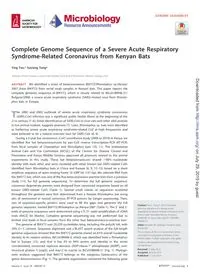
2019 Complete Genome Sequence of a Severe Acute Respiratory Syndrome-Related Coronavirus from Kenyan Bats PDF
Preview 2019 Complete Genome Sequence of a Severe Acute Respiratory Syndrome-Related Coronavirus from Kenyan Bats
Complete Genome Sequence of a Severe Acute Respiratory Syndrome-Related Coronavirus from Kenyan Bats Ying Tao,a Suxiang Tonga aDivision of Viral Diseases, Centers for Disease Control and Prevention, Atlanta, Georgia, USA ABSTRACT We identified a strain of betacoronavirus BtKY72/Rhinolophus sp./Kenya/ 2007 (here BtKY72) from rectal swab samples in Kenyan bats. This paper reports the complete genomic sequence of BtKY72, which is closely related to BtCoV/BM48-31/ Bulgaria/2008, a severe acute respiratory syndrome (SARS)-related virus from Rhinolo- phus bats in Europe. T he 2002 and 2003 outbreak of severe acute respiratory syndrome coronavirus (SARS-CoV) infection was a significant public health threat at the beginning of the 21st century (1–6). Initial identification of SARS-CoV in civet cats and other wild animals in live animal markets suggests zoonosis (7). Later, Rhinolophus sp. bats were identified as harboring severe acute respiratory syndrome-related CoV at high frequencies and were believed to be a natural reservoir host for SARS-CoV (8, 9). During a 5-year bat coronavirus (CoV) surveillance study (2006 to 2010) in Kenya, we identified five bat betacoronaviruses by pan-CoV reverse transcription-PCR (RT-PCR) from fecal samples of Chaerephon and Rhinolophus bats (10, 11). The Institutional Animal Care and Use Committee (IACUC) of the Centers for Disease Control and Prevention and Kenya Wildlife Services approved all protocols related to the animal experiments in this study. These bat betacoronaviruses shared �98% nucleotide identity with each other and were clustered with other known bat SARS-related CoVs identified from Rhinolophus bats in China and Europe (8, 9, 12–15) based on a short amplicon sequence of open reading frame 1b (ORF1b) (121 bp). We selected RNA from the BtKY72 bat, which was one of the five betacoronavirus-positive bats from a previous study (11), for full genome sequencing. To determine the full genome sequence, consensus degenerate primers were designed from conserved sequences based on all known SARS-related CoVs (Table 1). Several small islands of sequences scattered throughout the genome were first determined from a Kenyan Rhinolophus bat using sets of seminested or nested consensus RT-PCR primers by Sanger sequencing. Then, sets of sequence-specific primers were used to fill the gaps and generate the full genome sequence, named BtKY72/Rhinolophus sp./Kenya/2007 (Table 1). The 5= and 3= ends of genome sequences were determined using a 5=/3= rapid amplification of cDNA ends (RACE) kit (Roche). Complete genome sequencing was not performed due to limited viral loads in fecal samples from the other four betacoronavirus-positive bats. The genome of BtKY72 was 29,259 nucleotides long, including the poly(A) tail, with 39% G�C content. Sequence alignment and a BLAST search analysis of the full-length genome sequences showed that the BtKY72 genome shared an 81% overall nucleotide identity to its nearest relative, BtCoV/BM48-3, which was identified from a Rhinolophus bat in Europe (15), and that it has 93 to 94% amino acid identity in the seven concatenated, conserved replicase domains (ADP-ribose-1�-phosphatase [ADRP], non- structural protein 5 [nsp5], and nsp12 to nsp16) to BtCoV/BM48-31 (Fig. 1). Phyloge- netic analysis suggested that BtKY72 belongs to the subgenus Sarbecovirus of the genus Betacoronavirus (Fig. 1). The genome organization contained the following gene Citation Tao Y, Tong S. 2019. Complete genome sequence of a severe acute respiratory syndrome-related coronavirus from Kenyan bats. Microbiol Resour Announc 8:e00548-19. https://doi.org/10.1128/MRA .00548-19. Editor Kenneth M. Stedman, Portland State University This is a work of the U.S. Government and is not subject to copyright protection in the United States. Foreign copyrights may apply. Address correspondence to Suxiang Tong,
